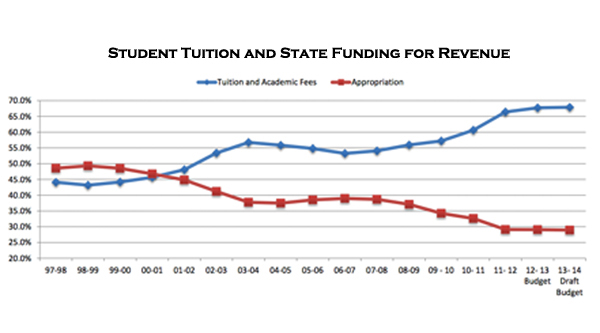President Cheryl Norton issued a letter to the Slippery Rock University community last Wednesday announcing a $5.2 million deficit expected in the operating budget for the 2014-2015 academic year.
“I wish I could tell you this was a one-time blip in the budget, but it is not. We expect the following two years to be as equally challenging,” Norton stated in the letter. “This deficit is due to a combination of factors: the fragile economic recovery, unavoidable increases in expenses and a declining population of high school graduates who are college ready.”
As this trend continues there are only two possible ways of accommodating for cost: decrease the total amount of revenue needed, and/or increase the amount of revenue gained.
Most of the university’s revenue comes from tuition costs and academic fees; however, that was not always the case. In fact, about ten years ago, the money the state dedicated to Slippery Rock exceeded the amount revenue generated by student tuition. Over the past four years, the state appropriation has gone down while tuition costs have increased.
Personnel reductions are a reasonable expectation for managing the deficit. “With nearly 80 percent of the University’s budget directed to salary and benefits costs, reductions will inevitably include some personnel,” Norton stated.
The University is already acting on this situation. There has been a letter of retrenchment issued to faculty, other unions were notified of the financial circumstances, reductions are expected and efforts are being made to generate more revenue.
According Molly Mercer, Interim Vice President for Finance & Administration, the University is taking an active role in informing the public about the budget. “This [deficit] might be different from some of the other budgetary challenges we’ve dealt with over time,” Mercer said.
A financial presentation from Mercer included a stance with regards to cuts and/or increases reminding the University community, stating, “the University cannot be all things to all people. The budget reinforces the strategic priorities of the University to preserve the overall quality of the institution.”
Determining how to manage the deficit is not an easy task. “This is something that we’re going to have to be very thoughtful about how we address. It’s not going to disappear anytime soon,” Mercer said. “We’re going to have to determine how to do more with less.”
“All areas of the institution are under review and will be focused on in the coming months.” Mercer explained. “This isn’t really a temporary blip. This is really the convergence of several things. We’ve called it the perfect storm sometimes, which is unfortunate.”
Realizing the importance of the matter, the university has created a link from the home page of the SRU website that explains exactly where the budget stands and offers a feedback form for suggestions regarding the budget. “It’s a really important part of our philosophy to have a very inclusive process,” Mercer said. “We want to make sure that all ideas are brought to the table.” The suggestions are posted anonymously to the site and available for anyone to examine.
“We need a lot of input and we’re hoping to get a lot of strong input,” Mercer said. “We do welcome student input.”

So far, suggestions have been made regarding travel expenses, office hours, the tuition reimbursement of university employees’ students, reviewing programming and much more.
“Consider not providing a free education to children of employees. This is a discriminatory and unfair policy. What ‘perk’ do employees without children get,” one contributor asked.
Another contribution suggested that “we stop pretending to our students, their families, the Board of Governors, the Legislature, the Governor himself, and the general public that we can meet the ‘challenges’ our state system institutions face without increased help from outside the institutions,” adding, “Whatever we do at Slippery Rock, it is imperative that our new chancellor and the board of governors succeed in convincing the governor and legislature that the state system schools cannot continue to offer the same quality of education to its students without increased support. Those people cannot look at our troubles as a ‘one-time blip’ either, but as a direct result of evolving public policy over the past twenty years.”
Mercer stated the contributions would all be reviewed, explaining, “I’ve been looking at it every other day just to understand the content. The process will follow is we’re going to be getting all that periodically kind of centrally and reviewing it at our cabinet meetings discussing maybe a particular issue might be addressed by one division or another.”
President Norton concluded her letter stating, “Despite the challenges we face, I know collectively we will find a way to continue to provide the excellent education and student learning experience for which Slippery Rock University is known.”
If you would like to contribute to the discussion about the budget or have suggestions for managing the deficit, feel free to respond to the form at: http://administration.sru.edu/webcomm/budgetform/.








